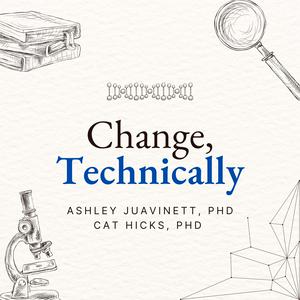Who's afraid of math?
SHOW NOTES: Cat wants you to know she read a *lot* of research for this episode. Major highlights we specifically drew from, and quote sources, were aross three reviews: Cat found this one especially helpful and refers to it the most, and this review also proposes the Interpretation Account of math anxiety: Ramirez, G., Shaw, S. T., & Maloney, E. A. (2018). Math anxiety: Past research, promising interventions, and a new interpretation framework. Educational psychologist, 53(3), 145-164. Amland, T., Grande, G., Scherer, R., Lervåg, A., & Melby-Lervåg, M. (2024). Cognitive factors underlying mathematical skills: A systematic review and meta-analysis. Psychological Bulletin. Chang, H., & Beilock, S. L. (2016). The math anxiety-math performance link and its relation to individual and environmental factors: A review of current behavioral and psychophysiological research. Current Opinion in Behavioral Sciences, 10, 33–38.We briefly mentioned tDCS. An introduction to this technique (used both for therapeutic applications and in scientific studies) can be found here: https://pmc.ncbi.nlm.nih.gov/articles/PMC5702643/ The specific study Cat & Ashley talk about, with math anxious adults, is this one: Sarkar, A., Dowker, A., & Cohen, K. R. (2014). Cognitive enhancement or cognitive cost: Trait-specific outcomes of brain stimulation in the case of mathematics anxiety. The Journal of Neuroscience, 34, 16605–16610. doi:10.1523/jneurosci.3129-14.2014Cat also mentions the connection between teachers’ gender stereotype endorsements and teachers’ math anxiety, and students’ math achievement. This study is here: Beilock, S. L., Gunderson, E. A., Ramirez, G., & Levine, S. C. (2010). Female teachers’ math anxiety affects girls’ math achievement. Proceedings of the National Academy of Sciences, 107(5), 1860-1863. Further helpful reading & evidence about both parental and teachers’ impact on math attitudes and gender from the same authors: Gunderson, E. A., Ramirez, G., Levine, S. C., & Beilock, S. L. (2012). The role of parents and teachers in the development of gender-related math attitudes. Sex roles, 66, 153-166.Learn more about Ashley: https://ashleyjuavinett.com/ https://mastodon.social/@analog_ashley analog-ashley.bsky.social Learn more about Cat: https://www.drcathicks.com/ https://mastodon.social/@grimalkina grimalkina.bsky.social


